Architecture which heals wounds of war or dignity no matter what
In circumstances of war it’s not only the re-building and preservation efforts that must be carefully planned and executed but architecture itself becomes a critical aesthetical and healing tool responding to the brutal Russian invasion of Ukraine and to the multiple humanitarian crises which emerged during the first weeks and months of the war.
How architecture can heal the wounds of war, both physical and psychological, how it can provide a sense of dignity to people whose spaces and privacy were destroyed by Russian aggression and recreate torn social connections - these key topics were discussed during a panel discussion titled “Shelter the Body, Nurture the Soul” at Ukraine House in Denmark after the opening of the "Spaces of Dignity" exhibition, as part of the Copenhagen Architecture Festival.
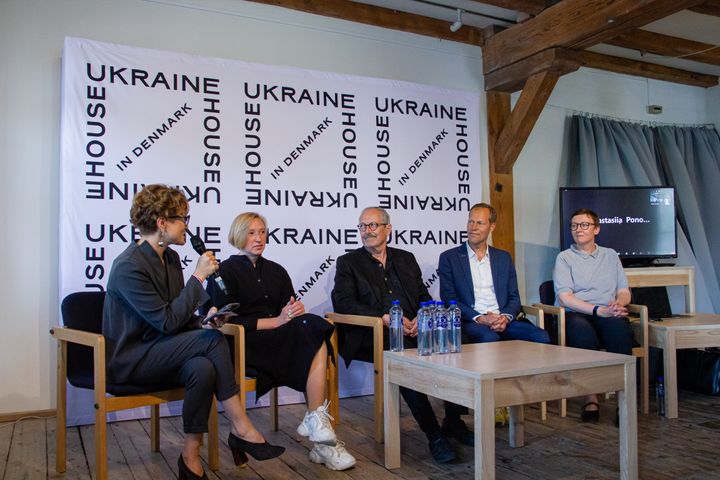
As of May 12, 2023, Ukraine's Ministry of Culture and Information Policy has noted more than 1500 cultural infrastructure objects which have been damaged or destroyed since the beginning of the full-scale Russian invasion of Ukraine. Among them are sculptural monuments that were damaged by shelling.
Among the initiatives highlighted at the discussion was balbek bureau, a Kyiv-based architecture and interior design studio which has developed a standardized solution that allows to quickly design a shelter for any monument, regardless of its size. The design of this system can protect monuments from damage by blast, debris, bullets, and fire.
Besides addressing issues of preservation in wartime, project, balbek bureau is also focusing on social projects such as Re:Ukraine Housing – a system of temporary housing for internally displaced persons in the Bucha region near Kyiv.
“It is the development of the way the displaced people have their shelters and have the options to live during such harsh times. We wanted to keep the main principle for all our projects, which is dignity no matter what. A sociologist's research showed that approximately 14 main types of families are looking for help. We developed for each of them a private scenario of living and six different sections of that social living,” – explained Borys Dorohov, co-founder and managing partner of balbek bureau.
Around 12 million Ukrainians have been displaced as a result of Russia's war against Ukraine. Of those, 6.5 million people moved to the western part of Ukraine from other parts of the country. In March 2022, urban laboratory from Ivano-Frankivsk MetaLab launched the CO-HATY project to create rapid housing for internally displaced people.
“We work with the context and research before we figure out what kind of topology we would like to suggest to forcibly displaced people… We observed life in shelters, interviewed internally displaced people, and learned about their experiences and needs. Based on this, we designed a set of furniture for temporary residences,” said Anastasia Ponomaryova, urbanist from Urban Curators and CO-HATY initiative.
In two months, MetaLab transformed temporary spaces into an environment fit for a midterm stay and accommodated more than 800 people.
"We constantly work with the people involved in the reform of urban policy in Ukraine, sharing our expertise," shared Anastasia Ponomaryova.
Besides accommodation, daily routine and organizing free time for displaced people is important as well. Together with Street Culture, Urban Reform had organized URBAN CAMP in March 2022 in Lviv, an initiative of more than 20 events held for residents with the goal of providing 200 accommodated IDPs with psychological support, daily meals, care and opportunities for comprehensive development.
“Urban Camp is a combination of accommodation and a community center for internally displaced families with children. We held a lot of events – master classes, art therapy, workshops, graffiti jam, hip hop jam, crossfit, bouldering,” recalled Oleksandra Naryzhna, architect, urbanist, CEO NGO Urban Reform.
Supported by Danish partner GAME, Urban Reform rebuilt 5,700 square meters of an abandoned building in Lviv into a great area for sports activities, with places for co-working, studying, and eating. The building's second floor became a home for 100 people.
“For us it was fantastic to be a part of this journey and see how that facility has come to life. Urban Reform and Street Culture really knew what they were doing. Our primary role has been to connect our Ukrainian partners with some funding,” said Simon Prahm, co-founder and CEO GAME.
In his opinion, culture will play a central role in order to build a strong Ukraine after the war ends.
“In the beginning it was a paradox to us that you on the one hand are giving out humanitarian aid and focusing on saving lives, and at the same time, focusing on activities for the youth such as a tournament in street basketball or breakdancing. And we in Copenhagen were thinking, Jesus, you just focus on saving lives, pass out the food and create some shelter… Until we realized that you were right! Because without any hope, without any culture, what are we fighting for? To me that was the most touching thing – to be part of this partnership and feel the hope and the dedication and the belief in tomorrow,” Prahm said.
Talking about the future rebuilding of Ukrainian cities, Danish urbanist and author of Humane Cities Karsten Pålson underlined how important it is to think about big, dense, organic, sustainable cities where people can live and meet each other. This way of building was popular in Copenhagen in the beginning of the 20th century. A good contemporary example of such is the new area of Slusenholmen in Copenhagen.
“City planning in your future Ukrainian cities should place the streets as the most important urban element. Always remember that. Try to keep the ground floors opened for activities. It can be anything where people can volunteer," Pålson said.
The discussion panel offered many points of reflection for the audience interested in issues of the current response to the Russian aggression and future reconstruction of Ukraine. Exchanging ideas, learning from the experiences of others, particularly in such unprecedented times, are imperative touchstones for new productive Ukrainian-Danish collaborations – precisely the idea behind Ukraine House in Denmark!
Social media:
For press inquiries, please contact Maya Zakhovaiko, communications lead, press@ukrainehouse.dk
Kontakter
Maya ZakhovaikoCommunications Lead of Ukraine House in Denmark
press@ukrainehouse.comBilleder
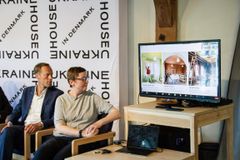
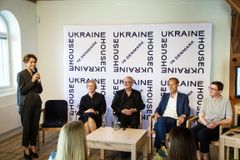
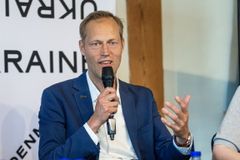

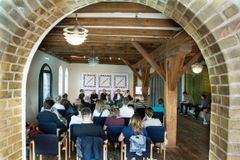
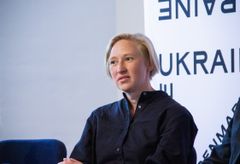
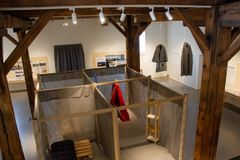
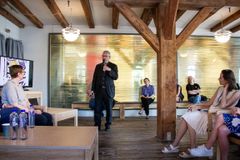
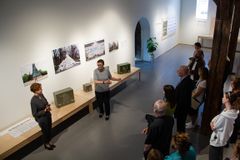
Links
Følg pressemeddelelser fra Ukraine House in Denmark
Skriv dig op her, og modtag pressemeddelelser på e-mail. Indtast din e-mail, klik på abonner, og følg instruktionerne i den udsendte e-mail.
Flere pressemeddelelser fra Ukraine House in Denmark
“The Ukrainian Model” — Rethinking Resilience for a New Era6.7.2025 10:29:48 CEST | Pressemeddelelse
Ukraine House in Denmark hosted Ukrainian civic strategist Yevhen Hlibovytskyi for a critical examination of how Ukraine is surviving the war—and what its experience reveals about the future of governance, democracy, and resilience in the 21st century. The event took place on June 24.
“Material Resistance: Ukrainian Design in Action” Exhibition: Ukraine House in Denmark at 3daysofdesign 202527.6.2025 08:00:00 CEST | Pressemeddelelse
Thank you to everyone who visited Ukraine House in Denmark during this year’s 3daysofdesign festival in Copenhagen. Since joining the festival in 2023, Ukraine House has become both a cultural landmark and a vital platform for showcasing contemporary Ukrainian design. Our historic space in the heart of Copenhagen once again welcomed visitors from around the world, hosting exhibitions, conversations, and moments of solidarity during the festival’s three vibrant days — June 18 to 20.
Ukraine House in Denmark presents “Material Resistance: Ukrainian Design in Action” Exhibition for 3daysofdesign in Copenhagen13.6.2025 08:00:00 CEST | Presseinvitation
From June 18 to 20, 2025, Ukraine House in Denmark will present “Material Resistance: Ukrainian Design in Action”, a collective exhibition showcasing innovative and resilient Ukrainian design as part of Copenhagen’s prestigious 3daysofdesign festival. The project is organized in partnership with the Library of Ukrainian Materials, the Ukrainian Association of Furniture Makers, and the design fair Material Matters (London).
Language as a Weapon: Confronting the Kremlin’s Rhetoric of Hate and Incitement to Genocide10.6.2025 08:00:00 CEST | Press release
As Russia wages war on the battlefield, it also wages a mental war of hate and disinformation. At Ukraine House in Denmark, a panel of leading experts came together to reveal how Kremlin-sponsored hate speech and disinformation are not only deepening Russia’s war against Ukraine—but may themselves constitute international crimes.The panel examined how language becomes weaponized: how it dehumanizes, distorts, and incites. This is not just about information manipulation—it is about cultivating moral indifference to atrocity.
“Taste of Ukraine”: An Evening of Remembrance and Solidarity with the Crimean Tatar People9.6.2025 08:00:00 CEST | Press release
On May 25, Ukraine House in Denmark hosted a special edition of its series “Taste of Ukraine”, dedicated to the Crimean Tatar people—their history, their struggle, and their resilient identity. The event took place in the shadow of May 18 which marks the deportation of Crimean Tatars by the Soviet regime in 1944, a historical trauma that continues to shape the destiny and identity of Ukraine’s indigenous people. More than a dinner, the evening became a space of communal remembrance, a moment to pause and confront the long history of oppression and reflect on the enduring fight for identity and belonging.
I vores nyhedsrum kan du læse alle vores pressemeddelelser, tilgå materiale i form af billeder og dokumenter samt finde vores kontaktoplysninger.
Besøg vores nyhedsrum